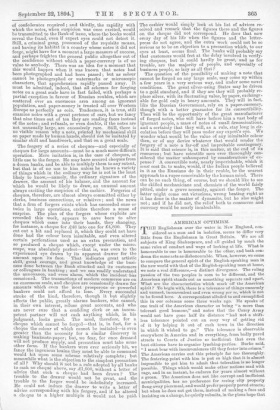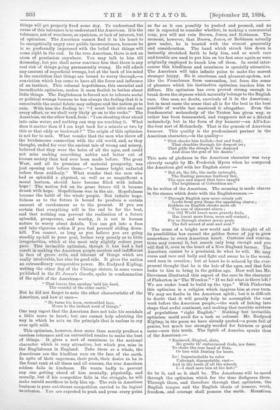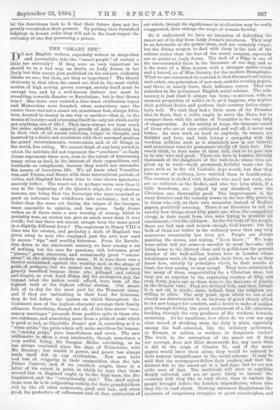AMERICAN OPTIMISM. T HE Englishman over the water in New England,
con- sidered as a man and in isolation, seems to differ very little from the Englishman in Great Britain. We are all subjects of King Shakespeare, and all guided by much the same rules of conduct and ways of looking at life. What is honourable to one is honourable to the other, and both con- demn the same acts as dishonourable. When, however, we come to compare the general spirit of the English-speaking man in the new world with that of the English-speaking man at home, we note a real difference,---a distinct divergence. The ruling passion of the two peoples is seen to be different, and the American spirit stands out as something separate and apart. What are the characteristics which mark off the American spirit To begin with, there is a tolerance of things unseemly and =meet, inconvenient and even wrong per se, which is not to be found here. A correspondent alluded to and exemplified this in our columns some three weeks ago. He speaks of one trait of the American character as being " a more than tolerant good humour," and notes that the Cozey Army would not have gone half its distance "had not a shift- less tolerance pointed out an easy way of getting rid of it by helping it out of each town in the direction in which it wished to go." This tolerance is observable everywhere in America and in everything, from badly paved streets to Courts of Justice so inefficient that even the best citizens have to organise lynching-parties. Burke said, " I must bear with inconveniences till they fester into crimes." The American carries out this principle far too thoroughly. The festering-point with him is put so high that it is almost impossible to get him to admit that toleration is no longer possible. Things which would make other nations mad with rage, and in an instant, he endures for years almost without a groan. The American does not like corrupt and inefficient municipalities, has no preference for seeing city property flung away piecemeal, and would prefer properly paved streets; but when he does not get them, instead of making a fuss and insisting on a change, he quietly submits, in the pious hope that things will get properly fixed some day. To understand the cause of this tolerance is to understand the American. It is the tolerance, not of weariness, or cynicism, or lack of interest, but of optimism. The American cannot find it in his heart to be energetically angry over public inconveniences, because he is so profoundly impressed with the belief that things will come right in the end. In the true American, there is not an atom of pessimism anywhere. You may talk to him till doomsday, but you shall never convince him that there is any real risk of things going permanently wrong. He will admit any amount of superficial wrongs, but at the back of his mind is the conviction that things are bound to worry through,—a conviction which has come to have all the force and influence of an instinct. This colossal hopefulness, this essential and ineradicable optimism, makes it seem foolish to bother about little things. The Englishman is forced not to tolerate social or political wrongs because he has always the feeling that it is conceivable the social fabric may collapse and the nation go to ruin. With him the feeling is : " I must look alive and use every effort, or we shall very likely go on to the rocks." The American, on the other hand, feels "I am shooting clear ahead into calm water, and nothing can atop me reaching it. What does it matter then if I am kept back for a minute or two by this or that eddy or backwash P " The origin of this optimism is not far to seek. What wonder that the men who threw off the burdensome connection with the old world, and, as they thought, ended for ever the ancient tale of wrong and misery, believed that they were the heirs of all the ages, and could not miss making something nobler and better out of human society than had ever been made before. The great West, and all its promises of material prosperity, was just opening out before them,—" a banner bright unfurled before them suddenly." What wonder that the men who had so splendid a physical, as well as so magnificent a moral horizon, should have become filled with infinite hope ! The nation fed on its great future till it became drunk with hope. Hopefulness was in the air. Hopefulness became the habit of the whole people. But infinite hope- fulness as to the future is bound to produce a certain amount of carelessness as to the present. If you are certain that everything will in the end be for the best, and that nothing can prevent the realisation of a future splendid, prosperous, and worthy, it is not in human nature to worry about details. You can get into a fuss and take vigorous action if you feel yourself sliding down- hill. You cannot, as long as you believe you are going steadily up-hill to your goal, bother very greatly as to little irregularities, which at the most only slightly reduce your pace. This invincible optimism, though it has had a bad result in making the American people careless and indifferent in face of grave evils, and tolerant of things which are really intolerable, has also its good side. It gives the nation an extraordinary recuperative power. Mr. Rudyard Kipling, writing the other day of the Chicago rioters, in some verses published in the St. .Tanzes's Gazette, spoke in condemnation of the spirit of the American- " That leaves him careless 'mid his dead, The scandal of the elder earth."
But he did not forget to note the other characteristic of the American, and how at once- " He turns his keen, untroubled face,
Home to the instant need of things."
One may regret that the American does not take his scandals a little more to heart; but one cannot help admiring the way in which he acts on the principle that is useless to cry over spilt milk.
This optimism, however, does more than merely produce a, careless tolerance and an untroubled resolve to make the best of things. It gives a sort of sunniness to the national character which is very attractive, but which you miss in the Englishman in England. Take them as a whole, the Americans are the kindliest race on the face of the earth. In spite of their eagerness, their push, their desire to be in the front rank at all times and all seasons, the true American seldom fails in kindness. He wants badly to prevent any one getting ahead of him mentally, physically, and morally, but if his competitor falls in the struggle, he will make untold sacrifices to help him up. The rule in American business is pure cut-throat competition carried to its logical Go aclusion. You are expected to push and press every point as far as it can possibly be pushed and pressed, and no one is expected to consider whether, in making a commercial coup, you will not ruin Brown, Jones, and Robinson. The moment, however, that Brown, Jones, or Robinson actually goes under, he is treated with the utmost generosity and consideration. The hand which struck him down is instantly stretched forth to help him, and as much care and trouble are used to put him on his feet once again as were originally employed to knock him off them. In social inter- course this kindliness and sunniness is specially attractive. The American will take infinite pains to make the merest stranger happy. He is courteous and pleasant-spoken, not like the Frenchman from convention, but from the sense of pleasure which his instinctive optimism teaches him to diffuse. His optimism has even proved strong enough to break down the shyness which naturally belongs to the English race. One sees, no doubt, survivals of it in the American; but in most cases the sense that all is for the best in the best possible of worlds has mastered it altogether. Even the fundamental melancholy of the Teuton has given way, or rather has been transmuted, and reappears not as a diluted melancholy, but in the form of dry humour —an All's-for. the-best sort of Melancholy. That is the genesis of American humour. This quality is the predominant partner in the American character,—is the quality--- "That checks him foolish—hot and fond;
That chuckles through his deepest ire ; That gilds the slough of his despond And dims the goal of his desire."
This note of gladness in the American character was very cleverly caught by Mr. Frederick Myers when he compared the American girl with her English sister :— " But ah, the life, the smile untaught, The floating presence feathery fair, The eyes and aspect that have caught The brightness of Columbian air."
So he writes of the American. The meaning is made clearer in the stanza which deals with the Englishwoman ;— " Through English eyes more calmly soft
Looks from grey deeps the appealing charm ; Reddens on English cheeks more oft The rose of innocent alarm ; Our Old World heart more gravely feels, Has learnt more force, more self-control ; For us through sterner music peals
The full accord of soul and soul."
The sense of a bright new world and the thought of all its possibilities has caused the golden flower of joy to grow somewhere in every American heart. Customs and conven. tions may conceal it, but search only long enough and you will find it, even in the heart of a New England farmer. The American cannot be a pessimist, do what he will. He may curse and rave and bully and fight and swear he is the worst. used man in creation ; but at heart he is solaced by the ever- present thought that he is the heir of the ages, and that fate looks to him to bring in the golden age. How well has Mr. Stevenson illustrated this aspect of the case in the character of Pinkerton in " The Wrecker." " If we fail what is there left I' We are under bond to build up the type." With Pinkerton this optimism is a religion which inspires him at ever turn. We may see faults in the American spirit; but it is difficult to doubt that it will greatly help to accomplish the vast work before the American people,—the work of licking into shape that awful continent, and making that terrible mixture of populations right English," Nothing but invincible optimism could avail for a task so colossal. Mr. Rudyard Kipling, in the poem we have already quoted—a poem full of genius, but much too strongly worded for fairness or good taste—sees this truth. The Spirit of America speaks thus of the American :— " Enslaved, illogical, elate,
He greets th' embarrassed Gods, nor fears To shake the iron hand of Fate, Or toss with Destiny for beers.
Lo ! Imperturbable he rules
Unkempt, disreputable, vast— And in the teeth of all the schools I—I shall save him at the last I"
So be it, and so it shall be. The Americans will be saved through the optimism which for the time disfigures them. Through them, and therefore through that optimism, the English tongue and the English ideals of honour, truth, freedom, and courage shall possess the earth. Meantime. let the Americans look to it that their future does not too greatly overshadow their present. By putting their furnished lodgings in decent order they will not in the least impair the certainty of one day possessing a palace.




































 Previous page
Previous page